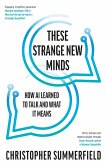Technology--always a key driver of historical change--is now transforming society as never before--and at a more rapid pace. How do we manage that technology to ensure that we humans, not the products of our invention, remain in control of our destinies?
In this informative overview, a veteran Rand Corporation researcher proposes a method for better understanding how technology is likely to evolve in the future. He identifies the attributes that a future successful technology will seek to emulate and the pitfalls that a technology developer should try to avoid. The aim is to bring greater clarity to the impact of technology on individuals and society.
In particular, he considers three technologies now converging to shape the future: biotechnology, artificial intelligence, and the "internet of things." He asks: Will we continue to develop new technologies in these fields merely because basic research shows that we can, or should we first consider the likely effects of these technologies on the quality of life--at the individual, social, and environmental level? Dr. Gerstein makes a compelling case that rational, informed, and consensual management of our technological options is the better course for ensuring a brighter future.
Dieser Download kann aus rechtlichen Gründen nur mit Rechnungsadresse in A, B, BG, CY, CZ, D, DK, EW, E, FIN, F, GR, HR, H, IRL, I, LT, L, LR, M, NL, PL, P, R, S, SLO, SK ausgeliefert werden.









